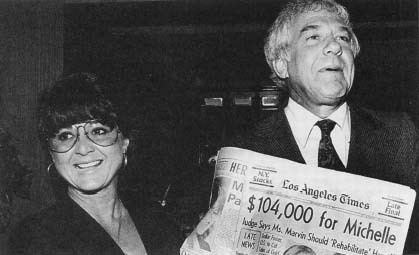The Marvin V. Marvin "Palimony" Suit: 1979
Career Claim Fails
The picture of a promising career Michelle Marvin claimed to have abandoned faded on the witness stand. Testimony by nightclub owners and singer Mel Torme appraised her talents as being somewhere between mediocre and "slightly better than average." She claimed that her devotion to Lee Marvin caused her to refuse a part in the Broadway musical Flower Drum Song, but dancer Gene Kelly denied ever offering her a role.
After 11 weeks in court, Judge Marshall ruled that Michelle Marvin had failed to prove her claim of an oral or implicit contract to share her lover's assets. Under the legal principle of "equitable remedy," however, the judge awarded her $104,000 so that she would "have the economic means to re-educate herself and learn new employable skills." The $104,000 "rehabilitation" figure represented $1,000 a week for two years, the top weekly salary she had earned as a singer before becoming the film star's companion.
 Michelle Triola Marvin and celebrity attorney Marvin Mitchelson after her victory in the first "palimony" case.
Michelle Triola Marvin and celebrity attorney Marvin Mitchelson after her victory in the first "palimony" case.
The judge stopped short of likening his decision to alimony or property division in conventional divorces. To accept the notion of equal division of property without a marriage contract, he wrote:
would mean that the court would recognize each unmarried person living together to be automatically entitled by such living together and performing spouse-like functions, to half of the property bought with the earnings of the other nonmarital partner.
Judge Marshall felt that this would come too close to recognizing the long-abolished concept of common-law marriage.
Both sides claimed victory. The only loser appeared to be attorney Mitchelson, who had taken the case on a contingency-fee basis, agreeing to be paid a percentage of the expected million-dollar settlement. Time magazine calculated that the years Mitchelson had invested in the case had earned him $6.50 an hour, a miniscule fraction of his normal hourly fee.
Mitchelson attempted to have the $104,000 award increased or, at least, to have Lee Marvin pay Michelle Marvin's legal bill. Judge Marshall refused. Mitchelson's only victory was that he had established the right to file a palimony suit, testing the legal property rights of unmarried couples for the first time. "This principle," ruled the judge, "did not come at the expense of the defendant." Mitchelson tried without success to get the State of California to pay him $500,000 for his work.
Observers debated whether Judge Marshall had set forth new legal guidelines for unmarried couples or had arbitrarily awarded an alimony payment under a different name. In 1981, the California State Court of Appeals overturned the $104,000 award, ruling that there was no basis in law for arriving at such a specific figure. The court's decision related only to the sum itself. The basic precedent set by the Marvin case remained, entitling estranged unmarried partners to sue for an equal division of their assets and prompting luckier couples to have legally binding nonmarital contracts drafted to guard against unforeseen future problems.
—Thomas C. Smith
Suggestions for Further Reading
Burnett, Barbara A., ed. Every Woman's Legal Guide. Garden City, N.Y.: Doubleday & Co., 1983.
Couric, Emily. The Divorce Lawyers. New York: St. Martin's Press, 1992.
Van Gelder, Lawrence. "Lawyers Troubled By Rehabilitation Concept In Marvin Decision." New York Times (April 20, 1979): 18.
Weitzman, Lenore J. The Marriage Contract: Spouses, Lovers, and the Law. New York: The Free Press, 1981.
Zec, Donald. Marvin: The Story of Lee Marvin. New York: St. Martin's Press, 1980.
Additional topics
- The Marvin V. Marvin "Palimony" Suit: 1979 - Suggestions For Further Reading
- The Marvin V. Marvin "Palimony" Suit: 1979 - Trial Enthralls Spectators
- Other Free Encyclopedias
Law Library - American Law and Legal InformationNotable Trials and Court Cases - 1973 to 1980The Marvin V. Marvin "Palimony" Suit: 1979 - Trial Enthralls Spectators, Career Claim Fails, Suggestions For Further Reading